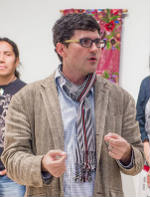The Return of Etsa and Iwia
The sky sang without words, its constellations poems
Nunkui the mother
removed her silence and
the moon,
echoing the night,
planted seeds and flowers in Iwia’s mouth.
The Shuar were a group of interethnic communities and societies among the constellations who lived in harmony with the animals and collectively respected life on earth for the sake of nature. However, when the cannibal Iwia came he brought fear with him and began the internal conflicts that live within us.
Etsa (the sun) was a male warrior with superhuman powers. When he saw the Shuar being exterminated by Iwia (the cannibal from the jungle), he came to their defense with the aid of: Yápankum, Kuyu, Tatasha, Aunts, and Sechakim, who had brought him messages about what Iwia was up to. The little animals Jaanch’ or Tsere, Sumpa, and Tiship were guardians of the road Iwia was on, and they managed to distract him to keep him from where he was going. The wise healers we call Uwishint’ had a spiritual relationship with Ampush, Pinchu, Yakakua, Tsukanká, Jaguars, boas, lakes, rivers, and other elements of the earth and sky. They helped Etsa through their dreams.
As time went by, Iwia also observed the inequalities that had arisen and were strengthened through abuses of power. Even though it’s invisible, right now his most powerful weapon is the greed promoted by capitalist thinking. It is an enemy that grows stronger through a lack of solidarity. It’s a mechanism through which money is valued over human beings, bringing inequality and disequilibrium. Returning to the new time is an opportunity to return to the world we’ve always dreamed of, a world where animals and humans live together on the earth, where generous crystal rivers bathe ancient rocks and no one subjugates anyone else.
Iwia can be transformed through Etsa’s solidarity, harmony, and patience, enabling us to conquer fear and remember what we are learning now. Like doctors who fight to save lives, police when they help a community, migrants who receive shelter, a ceasefire along borders, the loving care of a family during any crisis.
Three Poems
The Return
When I returned home
everyone welcomed me
The mountains show off their beautiful green faces
small farms surrounded by sown fields
that smell like chiaungu leaves
hiding from the voracious hands of tamale makers
we were guided by the voices of our wise ancestors
everything around me was abundance
the hanging vines in the trees held me
the birds sang
and a hummingbird announced that those not present were doing well
The Children of Arutam
We speak from our hearts.
We’ve acquired waterfalls of power
through grandfather tobacco, natem, maikiua and our ancestors.
We have the wisdom and power to decipher dreams.
We are the sun and the moon’s brothers and sisters.
Invisible hunters who fish in fresh water.
The daughters of Nunkui
we are the earth women, the clay women, the fertile nuwe woman of the new age.
Arutma uchirinji
Ii enentaijai chichaji.
Yaunchuya ii apachri tsaank, natem nuyá maikiua.
kakarman amasuiti tunanam.
Ii naatka enentai nuyá karamma kakarmari nekataish takakeaji.
Mesetnum awakmawitji etsa nuyá nantu yachí asar.
Wainchamu eamniutji nuyá namakash entsaya yumin achiniaitji.
Nunkui nawantri asar
Nunka puju nuwaitji,
yamaram kintia naatka nuwejai najanamu nuwaitji.



